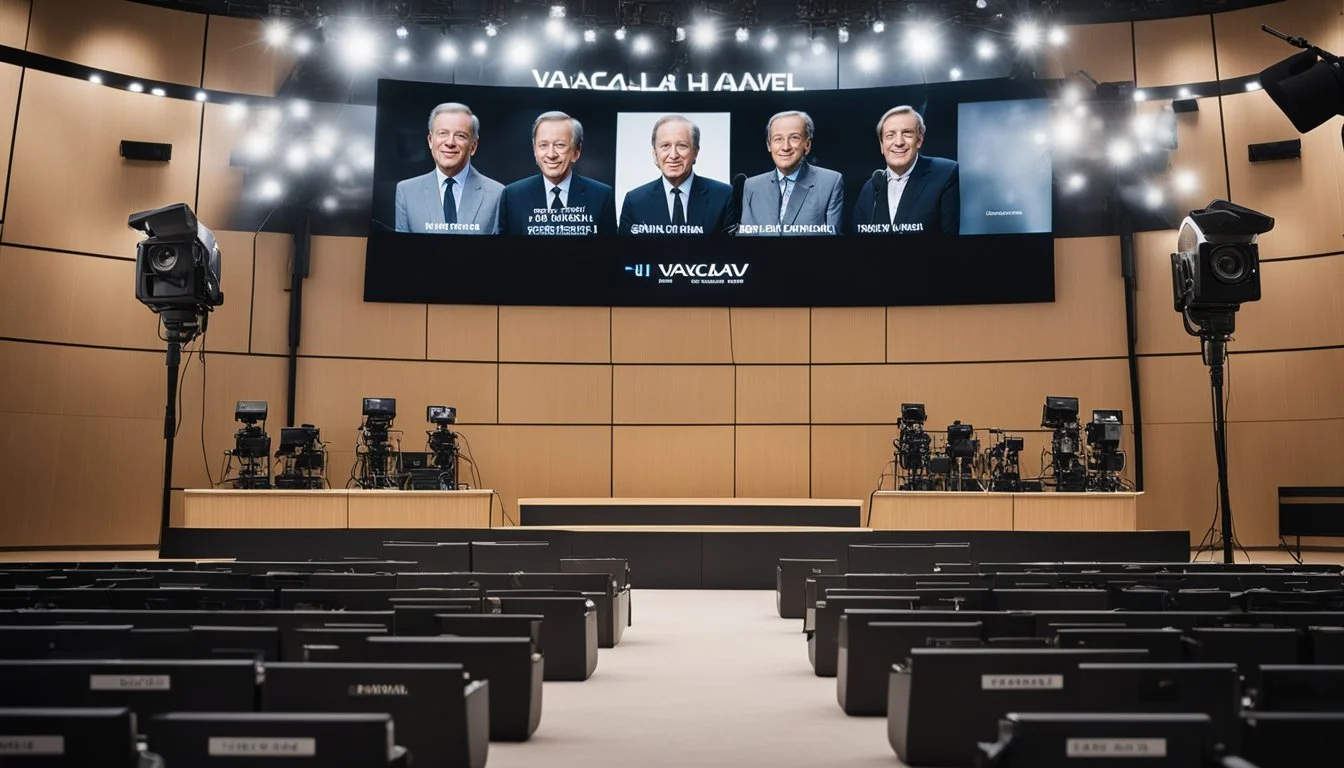7 Documentaries on the Political Legacy of Václav Havel
Insightful Journeys into Czech History
Václav Havel stands as a towering figure in both political and cultural history, renowned for his role in the 1989 Eastern European democratic revolutions and his subsequent presidency in the Czech Republic. His unique blend of playwright and dissident shaped how he led his nation through transformative times, making his life and legacy a compelling subject for documentary filmmakers.
What makes Havel's story particularly fascinating is his dual identity as a political leader and an ordinary man grappling with personal challenges. Documentaries on Havel provide valuable insights into his multifaceted personality, capturing not only his public achievements but also the intimate moments that reveal his character strengths and vulnerabilities.
1) Citizen Havel (2008)
"Citizen Havel" is an intimate biographical documentary directed by Miroslav Janek and Pavel Koutecký.
This film offers a behind-the-scenes look at Václav Havel's presidency in the Czech Republic. It covers his transition from a playwright and dissident to a national leader, capturing his struggle to balance political duties with personal life.
The documentary provides rare insights into Havel's decision-making processes and the challenges he faced. It includes footage of his interactions with both national and international political figures, giving viewers a comprehensive view of his leadership style.
You can find more information about "Citizen Havel" on IMDb.
2) The Power of the Powerless (2009)
"The Power of the Powerless" is a documentary that explores the impact of Václav Havel's essay of the same name. Narrated by Jeremy Irons, the film delves into the history of Czechoslovakia under communist rule.
The documentary traces the oppressive Stalinist government of the 1950s, the Prague Spring of the 1960s, and the hard-line backlash of the 1970s. It highlights how ordinary citizens were transformed into dissidents.
The film provides context on how the essay influenced political dissent and played a role in the eventual fall of communist regimes in Eastern Europe. It captures the essence of resistance and the spark of rebellion that Havel's words ignited.
Watch this documentary to gain insights into Havel's profound influence on political thought and action during a critical period in Czechoslovak history.
3) Havel: A Life in Freedom
Released in 2020, "Havel: A Life in Freedom" offers an intimate examination of Václav Havel's personal and political journey. The documentary presents a candid portrayal of the former Czech president's commitment to freedom and democracy.
Viewers gain insight into Havel's life as a dissident under Czechoslovakia's communist regime. Key moments, including his imprisonment and the Velvet Revolution, are depicted with archival footage and personal accounts.
The documentary captures Havel's ascent from a playwright to a pivotal political figure. His leadership and moral authority during the 1989 Eastern European revolutions are highlighted, showcasing his significant role in reshaping the region's political landscape.
Personal elements of Havel's story are also explored. The film illuminates his relationships, health struggles, and the values that guided his actions. It presents a balanced view of Havel, acknowledging both his strengths and vulnerabilities.
This portrayal helps viewers understand Havel's lasting impact on modern European history. It serves as both an informative historical document and a tribute to his enduring legacy.
4) The Play's the Thing
"The Play's the Thing" (2014) is a documentary that examines the intersection of art, politics, and activism in Václav Havel's life. Known for his significant influence on both the artistic and political landscapes, Havel's role as a playwright turned politician is explored in this film.
The documentary delves into Havel's unique ability to mix theater with politics, reflecting his life as a dissident intellectual during the oppressive regimes in Eastern Europe.
Through interviews and archival footage, the film showcases how Havel used his plays to comment on and challenge political authority, eventually becoming a key figure in the Velvet Revolution.
It also examines the enduring impact of Havel's work, not just on political practices but on artistic expression as well.
The documentary illustrates the journey of a playwright who navigated his way through political turmoil to become president of Czechoslovakia and later the Czech Republic, highlighting his steadfast commitment to freedom and democracy.
More information on "The Play's the Thing" can be found on IMDb.
5) The Legacy of Charter 77
Charter 77, initiated by Václav Havel and fellow dissidents, was a pivotal document in Czechoslovakia's fight for human rights.
Published in 1977, it called on the government to honor the human rights commitments made in the Helsinki Accords.
The document highlighted the systematic repression and violations occurring in the country.
Charter 77 inspired numerous civic movements by showing that peaceful, organized opposition could confront totalitarian regimes.
It led to greater international attention and pressured the Czech government to consider reforms.
The charter's emphasis on non-violent resistance and universal human rights principles continues to resonate in modern activism.
After the Velvet Revolution in 1989, which saw the end of communist rule in Czechoslovakia, Charter 77's principles lived on in the democratic governance of the nation.
Václav Havel, a key figure in Charter 77, later became President, embedding its ideals into the country's new democratic framework.
For more information, see Wikipedia.
6) Havel's Crucible
"Havel's Crucible" is a pivotal documentary that offers an intimate look at Václav Havel’s final years. It delves into his personal and professional challenges, capturing the essence of his life post-presidency.
The film, directed by Petr Jancárek, meticulously compiles 200 hours of previously unpublished footage. This raw material paints a comprehensive picture of Havel, beyond his well-known political identity.
By focusing on his battles with health problems, the documentary shows Havel's human side. It highlights his resilience and determination, even in the face of declining health.
This documentary is unique in that it allows viewers to see behind the scenes, presenting Havel in unrecognized contours. His character emerges through quiet moments, displaying his strength and fragility.
"Havel's Crucible" does not center on his political achievements. Instead, it provides a nuanced portrait of a man who remained steadfast in his principles until the end.
Watch "Havel's Crucible" to witness the multifaceted life of Václav Havel beyond the public eye. IMDB (2023)
7) The President, the Playwright
The life and career of Václav Havel are the focus of this compelling documentary. It explores Havel's journey from a banned playwright and dissident to the presidency of the Czech Republic. His unique transition from the arts to the highest political office is captured poignantly.
Havel's leadership during the Velvet Revolution of 1989 is highlighted. This peaceful uprising led to the end of communist rule in Czechoslovakia. The film provides insights into his ability to inspire a nation through his words and actions.
The documentary delves into Havel's struggle to balance his artistic aspirations with his political responsibilities. It shows his efforts to maintain personal integrity in the face of immense political pressure.
Throughout the film, viewers witness Havel's profound impact on the Czech Republic. His tenure as president is marked by his dedication to democracy and human rights. This documentary is a testament to his enduring legacy as both a leader and an artist.
The Historical Context of Václav Havel's Political Career
Václav Havel's political trajectory is deeply rooted in the oppressive conditions of Czechoslovakia under communism and the transformative events of the Velvet Revolution.
Czechoslovakia Under Communism
Czechoslovakia experienced significant political repression under communist rule, which began after World War II. The Communist Party solidified its control with the 1948 coup, and an era defined by censorship, lack of political freedoms, and state surveillance ensued.
During this period, Václav Havel emerged as a prominent critic. His plays, such as The Memorandum and The Garden Party, subtly critiqued the authoritarian regime.
The Prague Spring of 1968 offered a brief liberalization but was crushed by Soviet intervention, reinforcing the oppressive status quo. Havel's opposition grew stronger, leading him to become involved in Charter 77, a human rights manifesto that demanded the Czechoslovak government adhere to international human rights agreements.
The Velvet Revolution
The Velvet Revolution of 1989 was a peaceful protest movement that led to the fall of the Communist government in Czechoslovakia. Sparked by the 50th anniversary of a student protest against Nazi occupation, mass demonstrations rapidly gained momentum.
Havel emerged as a key figure during these events. He co-founded the Civic Forum, a political movement that united various opposition groups. His leadership and oratory skill were instrumental in negotiating the peaceful transition of power.
On December 29, 1989, Václav Havel was elected President of Czechoslovakia, marking the end of communist rule and the beginning of a democratic era. His presidency and role in the Velvet Revolution are seen as cornerstones of modern Czech history.
Roles and Achievements in Office
Václav Havel's tenure as president was marked by significant political experiences and impactful initiatives. His efforts helped shape modern Czech democracy and fostered a legacy that continues to resonate.
Havel as President
Václav Havel served as president of Czechoslovakia from 1989 to 1992 and subsequently as the president of the Czech Republic from 1993 to 2003. His leadership was instrumental during the Velvet Revolution that led to the peaceful end of Communism in Czechoslovakia.
Havel navigated the complex transition from a totalitarian regime to a democratic state. This involved overseeing the country's division into the Czech Republic and Slovakia in a peaceful manner, ensuring political stability during turbulent times. His presidency was characterized by strong advocacy for human rights and democratic values.
Key Policies and Initiatives
Havel enacted several policies aimed at integrating the Czech Republic into European and international structures. He championed the Czech Republic’s membership in the North Atlantic Treaty Organization (NATO) and actively supported joining the European Union (EU).
He also launched initiatives to combat corruption and promote transparency in government. Havel's policies fostered economic reforms that paved the way for a market economy, steering the country towards economic modernization. His commitment to civil society and free speech further solidified his legacy as a guardian of democracy and human rights.
His achievements laid the groundwork for the Czech Republic’s development and integration into the global community, securing his status as a pivotal figure in Czech political history.
Cultural and Artistic Contributions
Václav Havel’s impact extends beyond his political achievements, with notable contributions in the realms of playwriting and broader artistic influence. His works reflect a deep intertwining of art and politics.
Playwriting and Literature
Havel was an accomplished playwright whose works often explored themes of power, identity, and resistance. His absurdist play "The Garden Party" (1963) critiques bureaucratic systems, and "The Memorandum" (1965) delves into the absurdities of language and power.
He authored several essays and books, including Letters to Olga, which consists of letters written to his wife during his imprisonment. These works are significant in the canon of Czech literature for their rich, philosophical inquiries and sharp political commentary.
Influence on the Arts
Through his artistic endeavors, Havel left a lasting imprint on the cultural landscape. His plays are regularly performed worldwide, influencing countless artists and thinkers. The infusion of his political activism into his art creates a powerful narrative that resonates with audiences.
Beyond theater, his influence extended into film and visual arts, with several documentaries, such as "Václav Havel – A Life in Freedom," highlighting his multifaceted life. These works continue to inspire discussions on the role of art in society and politics.
Havel's Legacy and Global Impact
Václav Havel left a substantial imprint on both modern politics and human rights. His unique blend of moral authority and profound commitment to democracy redefined leadership in post-communist Europe.
Influence on Modern Politics
Václav Havel's political career was marked by a transition from playwright and dissident to a prominent statesman. His role in the 1989 Velvet Revolution symbolized a peaceful shift from authoritarianism to democracy in Eastern Europe.
Havel's presidency in the Czech Republic spanned 13 years, during which he focused on political reforms, transparency, and promoting civil society. His leadership inspired democratic movements across the former Soviet bloc and highlighted the power of non-violent resistance.
The legacy of Havel’s political philosophy extends beyond his region, influencing contemporary political structures that emphasize ethical governance and the importance of individual rights and freedoms.
Human Rights Advocacy
Beyond politics, Havel was a tireless advocate for human rights. His speeches and writings underscored the importance of freedom of expression, individual dignity, and the plight of oppressed peoples.
Havel's activism was recognized globally, earning him accolades such as the United States Presidential Medal of Freedom and the French Legion of Honour. These honors reflected his unwavering commitment to the principles of human dignity and justice.
Through his initiatives, such as the Forum 2000 Foundation, Havel created platforms for dialogue on global human rights issues, bringing together thinkers and leaders to address ongoing challenges in achieving universal freedoms. His impact resonates in today's human rights movements, illustrating the lasting power of his advocacy.






